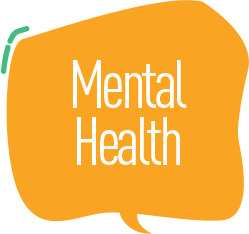Let’s talk about youth mental health.

It’s normal for children and teenagers to struggle with their emotions now and then. Growing up, going to school, and learning about the world can cause anxiety, stress, or short periods of depression.
However, if any of these issues last for a long period of time—two weeks or more—then they may be dealing with a mental illness that calls for professional help. It’s important to talk with your child to let them know that mental health is just as important as physical health, and to give them the support and tools to find the help they need.
What parents need to know
Mental health issues are common and nothing to be ashamed of.
- 22% of youth ages 13 to 18 experience some form of serious mental health disorder
Treatment is available for mental illness, such as therapy and medication. But many people do not get help.
- Only about 40% of those with a mental illness seek treatment.
- Half of those who do seek treatment wait an average of 10 years from the time they begin experiencing symptoms.
If not treated, mental illness can get worse and be dangerous.
- According to the CDC, suicide is the second-leading cause of death of kids in all age groups from 10 to 19.
- According to the NYS Department of Health, New York loses on average of 80 students to suicide each year.
- There are nearly 5,000 emergency room visits each year in New York for suicide attempts among school-age youth.
- Bullying, cyberbullying, abuse, a detrimental home life, loss of a loved one or even a severe breakup can be contributing causes to teen suicide.
- Mental health issues can cause a child to struggle in school.
What the law says
- If you or your child have a mental health issue, you are not alone. There are laws that make sure services, support, and systems are available for families.
- A child has the right to assessment, educational support, and family involvement.
- All schools are under these regulations for students from three years of age through the high school years.
- In New York, all schools are now required to provide mental health education in the classroom.
Starting the conversation
Talking to your child about mental health may seem intimidating, but it may be one of the most important conversions you will ever have. More than anything, it’s important to create a supportive and nurturing environment where you can improve your relationship with your child and prevent a lifetime of struggling.
- The conversation about mental illness doesn’t have to wait until a crisis. It’s always better to prevent a mental health problem from starting or addressing it as soon as possible.
- Involve the entire family and talk about any history of mental illness in the family.
- If your child has an experience with bullying, have them crumble up a piece of paper very hard. Then, have them attempt to smooth out the paper. The paper can never go back to its original condition. Explain to them that bullying leaves a mark on a person that can’t be repaired. Encourage them to stand by a friend for support. Stay on top of the situation.
- If you deal with depression or anxiety yourself, normalize it. Take your medicine in front of your kids, and if they ask what it is, explain to them it’s something to help you feel better. But also explain that a doctor prescribed it and it’s a drug that is just for you.
- Open up the conversation by putting it out there. “You know I love you and whenever you need me for anything you can tell me.” Let them know you won’t judge them and that the two of you can have a conversation, not a confrontation.











